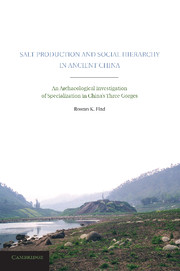 Salt Production and Social Hierarchy in Ancient China
Salt Production and Social Hierarchy in Ancient China Book contents
- Frontmatter
- Contents
- List of Figures and Tables
- Acknowledgments
- Prologue
- 1 Introduction
- 2 Production and Specialization in Complex Societies
- 3 Ancient Salt Production in Sichuan
- 4 The Zhongba Site
- 5 Ceramic Evidence
- 6 Parameters of Production According to Ceramics
- 7 Features and Spatiality
- 8 Animal Remains and Divination
- 9 Conclusions and Implications
- Epilogue
- Appendix A Chinese and Japanese Term List
- Appendix B The (t) Value and Average Thickness for Each Level Excavated in DT0202
- Appendix C Calculating the Scale of Production Using Briquetage from DT0202
- Appendix D Taxon List for Specimens Recovered from DT0202 with Number of Identified Specimens and Minimum Number of Individual Count by Phase and Subphase
- Notes
- Bibliography
- Index
2 - Production and Specialization in Complex Societies
Published online by Cambridge University Press: 07 September 2011
- Frontmatter
- Contents
- List of Figures and Tables
- Acknowledgments
- Prologue
- 1 Introduction
- 2 Production and Specialization in Complex Societies
- 3 Ancient Salt Production in Sichuan
- 4 The Zhongba Site
- 5 Ceramic Evidence
- 6 Parameters of Production According to Ceramics
- 7 Features and Spatiality
- 8 Animal Remains and Divination
- 9 Conclusions and Implications
- Epilogue
- Appendix A Chinese and Japanese Term List
- Appendix B The (t) Value and Average Thickness for Each Level Excavated in DT0202
- Appendix C Calculating the Scale of Production Using Briquetage from DT0202
- Appendix D Taxon List for Specimens Recovered from DT0202 with Number of Identified Specimens and Minimum Number of Individual Count by Phase and Subphase
- Notes
- Bibliography
- Index
Summary
The framework discussed in this section was built specifically for use in archaeological contexts where textual sources are either absent, scarce, or do not address the production systems in the associated society. In this model, numerous parameters of specialized production, including intensity, concentration, constitution, and context, are distinguished from one another so that the full variability in production systems can be explored. Among these parameters, studies of context often depend on assumptions about the connection between the type of object being produced and the organization of production. Specifically, the production of prestige goods is thought to imply some form of attached production. Yet such an association incorrectly assumes that the ontological nature of a product is easily identified, essential, and unchanging and oversimplifies the connection between product type and context. When models such as this one are used to examine the organization of manufacture of products whose nature is difficult to determine a priori (such as salt), some of the preconceptions associated with the model need to be reassessed.
- Type
- Chapter
- Information
- Salt Production and Social Hierarchy in Ancient ChinaAn Archaeological Investigation of Specialization in China's Three Gorges, pp. 16 - 34Publisher: Cambridge University PressPrint publication year: 2011
- 1
- Cited by


